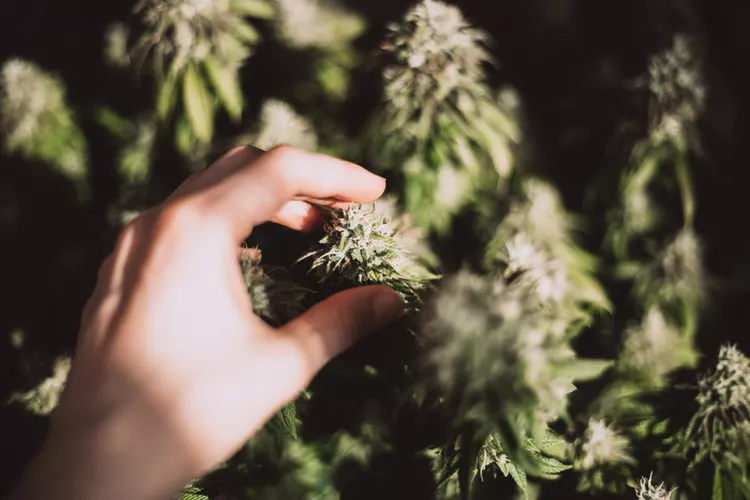Pharmacy Regulation
Is Marijuana Addictive?
What is the most important information I should know about marijuana?
- Marijuana can have serious health risks, including negative effects on cognition, an increased risk for psychosis, and a risk for dependence and addiction.
- While several states have legalized marijuana for medicinal or recreational use, it is essential to be aware that marijuana is still illegal according to federal law. This also applies to any cannabis-derived products containing more than 0.3% THC
While marijuana (cannabis) is one of the most commonly used drugs in the United States, many people have the same question: Is marijuana addictive? The answer is yes, it can be. While not everyone who uses marijuana will become addicted, it is not uncommon, and certain factors may increase your risk.
However, some who use marijuana develop the symptoms of addiction after chronic marijuana use.1 Marijuana also poses several other health risks that people should consider.
Is Marijuana Addictive?
Cannabis use disorder, or marijuana use disorder, results from chronic cannabis use. It is defined in the fifth edition of the Diagnostic and Statistical Manual of Mental Disorders (DSM-5) as a result of either dependence or abuse of marijuana.2
Prevalence
The National Institute on Drug Abuse (NIDA) reports that 30% of people who use marijuana will develop problems with its use, known as marijuana use disorder.3
Signs of Marijuana Addiction
Someone who becomes addicted or dependent upon marijuana will likely display some of the classic behavioral symptoms of addiction, which include:4
- They will begin to need increasingly larger amounts.
- They will spend more time thinking about using.
- Substance use will begin to take a central role in their life.
- They will spend more time and money acquiring more marijuana.
- They will become irritable or agitated if they run out.
- As negative consequences mount, they will continue to use.
- They will deny claims from those close to them that they have changed.
Two of the most common signs of cannabis use disorder are physical dependence and withdrawal.
Marijuana Dependence
Most experts agree that dependence on a substance is accompanied by a build-up of tolerance to that substance, requiring increasingly larger amounts to get the same effects and leading to withdrawal symptoms when someone stops using the substance.5
Most early research into marijuana addiction suggested that marijuana use rarely produced tolerance and withdrawal. However, the marijuana that is available today is more potent than the marijuana of the 1960s, containing higher levels of the active ingredient delta-9-tetrahydrocannabinol (THC), which is the psychoactive component in marijuana.6
The increased potency of modern marijuana strains means that there is a greater risk for tolerance, dependence, addiction, and withdrawal.
In addition, it has been found that marijuana dependence may affect your ability to respond to the neurotransmitter dopamine, which allows us to feel pleasure. In one study, those who had marijuana dependence had fewer positive emotions, higher stress levels, and increased irritability.7
Marijuana Withdrawal
Today’s research shows that tolerance does develop to THC and that withdrawal symptoms do occur in some people. Studies of those who chronically use and then quit marijuana show that they experience these withdrawal symptoms:8
- Anxiety and insomnia
- Loss of appetite
- Excessive salivation
- Decreased pulse
- Irritability
- Increased mood swings
- Increase in aggressive behavior
Some researchers believe that because today’s marijuana is much more potent, it makes it more likely that some people will develop physiological dependence.9
Even if not physically or chemically dependent on marijuana, some people will develop a psychological dependence upon the drug. This often persists despite a person knowing they have a dependence or wanting to quit.10
Why Is Marijuana Addictive?
Experts are still investigating why some people become addicted while others don’t. There are various reasons that a person might become dependent on marijuana. Of course, this doesn’t mean that you will develop an addiction to marijuana if you experience one or more of these risk factors.
Higher Potency Factor
Marijuana is made up of many components called cannabinoids. Two of these components, delta-9-tetrahydrocannabinol (THC) and cannabidiol (CBD), have effects that are commonly known to people who use marijuana. THC is known as the substance that makes a person feel a “high,” while CBD often promotes a feeling of relaxation.
The NIDA reports that the higher potency of marijuana available today—specifically in regard to its THC levels—may be a factor in the rising number of people who develop a problem.11
Is THC Addictive?
THC can be addictive. Studies suggest that THC is the substance that creates the potential for marijuana addiction because of its psychoactive properties.12
Today, marijuana typically contains more THC than in the past. For instance, marijuana confiscated by law enforcement today contains an average of 15% THC compared to less than 4% in marijuana confiscated in the 1990s. Researchers are investigating if higher potency is the reason for an increase in emergency department visits by people testing positive for marijuana.13
Marijuana consumed in products made from marijuana extract, such as a solvent-based oil, contains between 54% and 69% THC—in some cases, exceeding 80%.14
Age People Begin Smoking
Experts are finding a link between the age you begin using cannabis and the likelihood that you’ll develop a dependence on it. One study found that people who used cannabis starting at age 14 to 15 had a higher probability of developing dependence. On the other hand, for those who started using cannabis after age 15, the risk of developing a dependence drastically decreased.15
Another study found that those who begin using marijuana before the age of 18 are four to seven times more likely to develop a cannabis use disorder later in life.16
Frequency of Use
Daily or weekly marijuana use has been found to increase the chances that a person becomes dependent on the drug in the future. However, how a person engages with marijuana is an important factor as well. For instance, one study found that “solitary use,” or using the drug by yourself, was a strong sign that dependence would form in the future.15
Genetics
Family relationships have been found to play a role in some cases of cannabis addiction. For instance, one study found that if your biological parents abuse alcohol or other drugs, you may be more likely to abuse alcohol or other drugs, including marijuana.17
A 2020 study found that people have “genetic liability” with cannabis use disorder, meaning they are born with specific genes that increase their risk.18 However, experts agree there are usually more contributing factors, such as environment, access to marijuana, socioeconomic status, and more.
Mental Health
Some studies have found that people often engage in cannabis use to lessen their feelings of anxiety or depression, and that self-medicating in this way can often lead to drug dependence. Other mental health considerations have been noted in people with cannabis dependence as well.
This includes people coping with panic disorder, with symptoms of ADHD, social anxiety disorder, and low self-esteem. People dealing with poor sleep quality may also use cannabis to relieve these symptoms (although in the long term, it’s been found to decrease sleep quality).19
Research is mixed as to whether mental health issues are more often the cause of cannabis abuse, or whether dependence on cannabis can, in turn, lead to mental health issues.15
Effects of Marijuana Addiction
There are many chronic effects associated with cannabis use disorder. It has been found people with this condition often experience impaired cognitive functioning. This might mean:20
- Memory loss
- Trouble concentrating
- Decreased problem-solving skills
- Low ability to control emotions
- Difficulty making decisions
Cannabis use disorder can impact other areas. Studies have found those who struggle with cannabis dependence often find dissatisfaction in various areas of their lives, including relationships, work, and education.21
Treatment for Marijuana Addiction
Treatments are available that can help people overcome marijuana addiction. Such treatments primarily focus on psychotherapy, but researchers are also exploring medications that might someday be helpful.22
Therapy
Fortunately, there are many types of treatment for cannabis use disorder. These include specific types of therapy.
- Cognitive behavioral therapy (CBT): Research suggests that CBT can be an effective treatment for cannabis use.23 A therapist will work with you to address any underlying mental health issues, thoughts, or behaviors that contribute to your addiction. Together, you identify healthy coping mechanisms to address these.
- Contingency management: This method is sometimes used at substance abuse clinics. It focuses on promoting positive behavior (abstaining from marijuana) through rewards. For example, a clinic might give material objects as prizes or even give money to those with negative drug tests.24
- Motivational enhancement therapy: This focuses on a person’s internal attitudes and beliefs. A therapist would help you to create statements that reflect why you want to stop using marijuana, and together, you create an action plan to quit.25
Lifestyle Modifications
In addition, certain lifestyle changes may help you reduce or stop your marijuana use.
- Change your social environment: It can be more challenging to quit cannabis when those around you are still using it. One study found that people who recovered from cannabis use disorder found it helpful to socialize with people who did not use cannabis as part of their recovery.26
- Focus on the reasons you want to quit: If you remind yourself of the reasons you want to quit cannabis, you might feel more motivated. Try keeping a list of reasons in your bedroom or on your fridge so you see it everyday.
- Engage in new hobbies: You will probably have more time on your hands when you quit marijuana, so it can be useful to find a new hobby or activity that you enjoy. This can help distract you from any cravings as well as boost your mood, especially if it’s physical activity.
People develop cannabis dependence for different reasons, so it’s important to address any underlying issues. For instance, those who use marijuana to cope with anxiety, depression, or sleep disorders can find more appropriate treatment types—including lifestyle changes, therapy, and medication—to help relieve their symptoms.3
Medication
In addition, experts are investigating whether there are specific medications that can help with cannabis use disorder. There are currently no medications approved for the treatment of cannabis use disorder.
Research suggests there are currently no effective medications in the treatment of cannabis use disorder.27 Buspirone was one medication of interest, but some research has shown that it is no more effective than a placebo and, in some cases, was linked to worse cannabis use outcomes.28
Medications such as antidepressants may be prescribed to treat co-occurring mental health conditions such as anxiety or depression. You can consult your healthcare professional to see if this is a viable treatment option.

